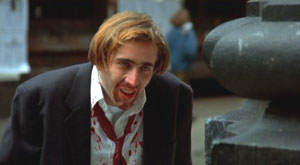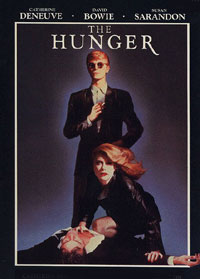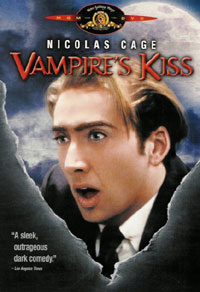An early starring vehicle for Nicolas Cage was Vampire's Kiss (1989), in which he plays a depressive "false vampire." All these many years later Cage is still overacting & still sort of cute, & still taking chances in cheezy movies some of which turn out not all that bad.
 Playing a business executive with a manic belief he's a vampire required a hammy performance, so it's thousand-percent perfect casting. Playing a business executive with a manic belief he's a vampire required a hammy performance, so it's thousand-percent perfect casting.
Cage lends a certain depth of gloom & misery to the confused & occasionally deliriously glad character of Peter, whose grasp on reality becomes less & less certain as he delves ever deeper into the belief that he's turning into a bloodsucking monster.
He carouses the city streets & bars by night seeking random encounters with women, & finding in each encounter one or another bit of evidence of the terrible "truth" about himself & what is possible in his world.
Though actually a film about delusion & mental illness, & not specifically a horror film, Vampire's Kiss is strange enough to be enjoyable as fantasy-horror even if it can all be rationalized by the fact of Peter's madness.
And the film has a smart-ass attitude about lust, love, & lunacy such as one doesn't usually see filmed about the mentally ill. So it works as a little art-film about something serious, & it works on a cruelly campy level of laughing at the ill.
 The Hunger (1983) was an artfilm for nurdy vampire romantics. Catherine Deneuve was well-cast as an ageless vampire, & David Bowie gives one of his best film performances probably because it calls for his character not to emote much, but just to pose & be pretty.
The Hunger (1983) was an artfilm for nurdy vampire romantics. Catherine Deneuve was well-cast as an ageless vampire, & David Bowie gives one of his best film performances probably because it calls for his character not to emote much, but just to pose & be pretty.
Susan Sarandon is the young woman for whom the lusty vampire has a decided desire. Lesbianism has long been a part of vampire lore (the three demonesses of Bram Stoker's Dracula or the lesbian vampire of Joseph Sheridan LeFanu's Camilla just the tip of that story), & it always kind of annoyed me that vampire films didn't get that.
The Hunger did get it, & I appreciated that. And yet the film was a little empty even so.
There's damned little plot. There's a novel idea here, that vampires don't fully convert mortals, but can only keep their lovers ageless for a while. David Bowie is getting worn out & it's time to trade up, & the vampire's next object of affection will be same-sex.
It's more of an extended mood piece with eroticism rather than horror or storytelling in mind. It's so visual with its soft focus hardly-any-dialogue approach that it comes off more like a sick & twisted shampoo commercial than a vampire flick.
Continue to next vampire film:
Strange Things Happen at Sundown (2003)
copyright © by Paghat the Ratgirl
|

 Playing a business executive with a manic belief he's a vampire required a hammy performance, so it's thousand-percent perfect casting.
Playing a business executive with a manic belief he's a vampire required a hammy performance, so it's thousand-percent perfect casting.